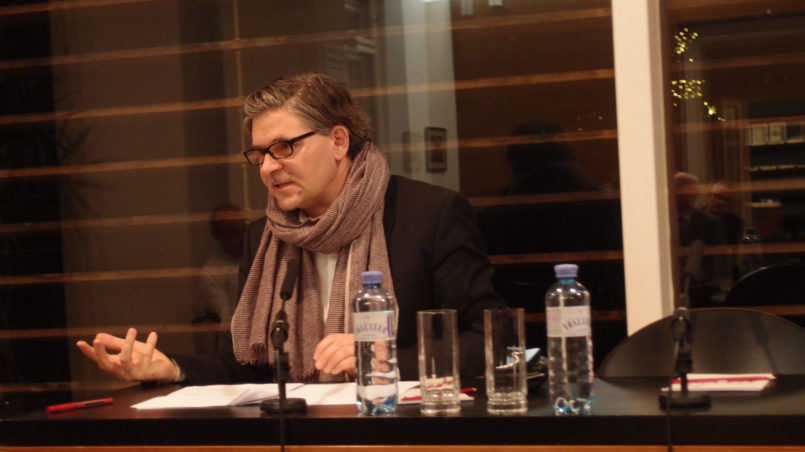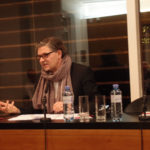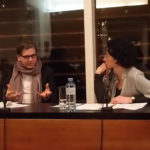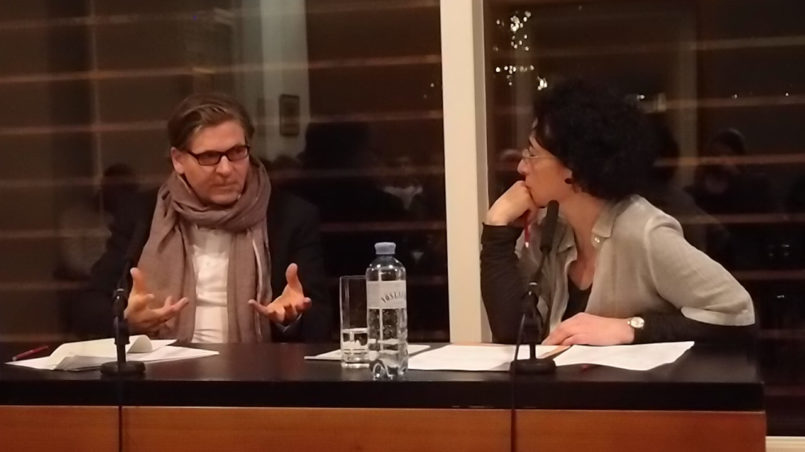Democracy and Religion

Event data
- Datum
- 12. 12. 2016
- Host
- Bruno Kreisky Forum
- Location
- Bruno Kreisky Forum
- Event-type
- Vortrag
- Participants
- Jan-Werner Müller, Politikwissenschaftler, Autor
- Isolde Charim, Kuratorin, Moderatorin
Jan-Werner Müller hosted a workshop discussion in the Bruno Kreisky Forum on the topic of his research, “Democracy and Religion” which he conducted in the course of a fellowship from the Institute for Human Sciences, Vienna.
What induced Müller to conduct research on this topic?
First, it is clear in Europe that the political world is being influenced in a more decisive manner from a Christian democratic background and its ideas. Historians, however, appear to be hardly aware of this.
Second, Müller arrived at this topic via his actual field, populism, because many parties bear the word “people” in their name but are not connected to populism. Müller poses the question of whether these parties have found other ways to appeal to the people and whether something can be learned from this.
Third, the question of the democratic potential of Islam arises. Since well into the 20th century, many things were said about Catholicism which are now being atttributed to Islam e.g. that religion (Catholicism then, Islam today) is not capable of being democratic. Müller points out that there are possibly interesting analogies and lessons to be learned from this.
The history of Christian democracy
Moreover, democracy is in principle institutionalised insecurity as there are choices whose outcome is always uncertain – this could be seen in both a positive and a negative light.
This is a challenge for religious actors because, if the “false ones”, in their opinion, achieve a majority, they could perhaps systematically take action against the church. For religious actors, the philosophy and the accompanying relativism is a problem because if the church is bestowed with absolute claims to truth, there is no longer a need to adjust from its perspective.
To do so, Müller has a thesis that three strategies became important:
First strategy: it is best when the people become as religious as possible.
Democracy means a maximum of freedom, whereby the people need basic moral “equipment” as a support – for this, Catholicism is good because it provides the values and ways to behave. The system would thus be self-regulated by the people.
Second strategy: Institutions which keep the people under control, such as a constitutional court, should be created.
Ratzinger on this: democracy without Christianity is totalitarianism and it is precisely religion which can provide morals. The Church is, therefore, vital. Exactly for this reason it is so important that the Church itself is not democratised – because then it could no longer constitute a counterweight.
Third strategy: parties should make Christian democracy safe.
Hans Maier, later the Minister of Culture in Bavaria, stressed that Europe needed these parties because in Europe itself a Christian democratic society did not exist. The purpose of these parties was not to introduce believers gently to democracy: rather they should have a defensive function, to offer protection from an overly liberal, overly secular state.
It is interesting that the names of these parties very often contain the prefix, “people”. This is intended to express the fact that the party itself considered to be close to the people but in no way was this a categorical acceptance of democracy.
The Vatican and Christian democracy
On the topic of the Vatican and Christian democracy, Müller sees a further problem because the reservation vis-à-vis Christian democracy had an ideological background which had to be taken seriously: the Church had to show itself pluralistically, as one party among many, if it accepted Christian democracy. That, however, is not the position of the Church. And therefore the relationship of the Vatican to Christian democracy was rather a difficult one.
Müller sees this as the most plausible explanation for the cooperation that emerged. Müller further stresses that events could have take a completely different course because, at this time, a quote from Ernst-Wolfgang Böckenförde dominated: “The liberal, secularized state lives from prerequisites which it cannot itself guarantee.”
Today this sentence would be read as meaning that democracy itself is fragile and would thus need an injection of moral from the outside (i.e. from the Church). Originally, however, this sentence meant exactly the opposite for it continues:
The liberal secularized state lives by prerequisites which it cannot guarantee itself. This is the great adventure it has undertaken for freedom’s sake.
At this time Böckenförde attempted to strengthen this by digging for citations in which the Church welcomed the Third Reich. He took advantage of this when he stated: “When you repeat that which occurred in 1933: ‘we Catholics will only take care of a small part, the regime is irrelevant for us’ and the same can happen to you again“. This statement was adopted and over time has been accepted by many Catholics.
From the 1970s Böckenförde himself once again stressed the other interpretation that democracy does indeed need religion as a structural form of government.
Christian democracy and the three strategies today
In terms of the third strategy, the Christian democractic parties, today Müller does not envisage a great future, the German CDU being the exception. Today parties no longer have the integration policy function which they had in the 1950s and 1960s. They have lost their basis, a coalition of peasantry and middle class and industrialists.
According to Müller, it is also interesting that in many countries cultural battles are increasingly prevailing; he refers to Spain where the Catholic church has become very active in the last decade against, among others, the Socialist Prime Minister at that time, Zapatero, and France where hundreds of thousands took to the streets in order to protest against same-sex marriages and finally Pope Ratzinger, who resigned and who maintained a clear cultural conflict position.
In the meantime there are again some parties which state: Christianity is not an ethos for us but rather national identity. In this context Müller mentions Orbán who said, “I offer you a Europe-wide ideology, come to me, I am the last authentic representative of a Christain democratic national position with strictly conservative family policy, ideological formation of society and the true Europe is conservative.”
Here, Müller recognises a return to the first and (partly) second strategies but without the adoption of the fundamental ideas of pluralistic democracy.
Liberalism as part of the problem:
The British theologian, John Milbank, leads an anti-liberal programme. He assumes that the problem of liberalism is precisely the opposite of what Böckenförde said. Because liberalism can not only guarantee its prerequisites but also in fact fulfil them, it thereby becomes a self-fulfilling prophecy. In the modern state we all become egoistic, aggressive actors. This is the basic idea why we should leave liberalism as a whole as far behind us as possible.
In the economy we should once again concentrate on ideas such as solidarity, decentralisation, social economy, on everything that moves away from a strong state with an atomistic people. Instead we should have a policy which is as pluralistic and as decentralised as possible, divided into various institutions. Müller does not believe that one of these strategies could be trasmitted 1:1 into the present but the awareness of this is enormously important.
Interview with Isolde Charim
Is religion capable of being democratic?
There are good reasons why religious actors of democracy are initially sceptical and this is also normal. But there are other contexts because the danger always exists that politics gets the upper hand and corrupts religion.
Jan-Werner Müller and Isolde Charim
A democratic subjectivity also belongs to democracy and the three strategies are, for me, strategies to cancel and nullify this subjectivity. I believe that the true core of these strategies, defensive institutions, sealing off of democracy against contingency, are all forms to actually cancel genuine democracy.
True, but there are many theologians, theorists and philosophers who say the exact opposite: In a certain way, democracy is rooted in Christianity.
On this point, Maritain becomes interesting – he said: “I am anti-liberal. Liberalismus is for me materialism and we need something different. We need the construct of personalism. That is all that you want as regards human rights, equality and the collective has always been included.”
If now bridges are built to Islam then the question clearly is of a construct with which both believers and non-believers can live. Everyone could be certain that, due to this ideal – to the extent that is is accepted – one side would not suddenly pull out and say: “Now that we have the majority, we will oppress you after all.”
There have been political scientists who said: “You only have to let them be. When they are in power, they will no longer have time for grand ideological ideas behause then they have to show results.” After the events in Egypt in 2011, this theory however does no appear so plausible and in any case, this approach is not democratic since it is assumed that, already in advance, it can be said how the situation will be.
Let us return once more to Böckenförde, who said: The liberal state lives from the prerequisites also when it takes the risk for the sake of freedom, it needs these prerequisites and, in Böckenförde’s opinion, it cannot provide this “ammunition depot“. Is this not a false understanding of democracy?
The best counter-argument is to say: Only when certain democratic basic practices are learned can convictions prevail where these “injections” of moral substance from outside are no longer needed.
To be fair, it has to be added here that Böckenförde also said that it does not have to be religion but rather that it could also be science, art – it only has to be something different, an opposition is needed. In the late 1970s there was a debate on “basic values” when Böckenförde was the advisor of Helmut Schmidt and refused to say that religion is always needed. This was also why the Church was angry with Böckenförde – he did not use his office to campaign for the Church as producer of meaningfulness and morality.
Böckenförde is a complex figure who upholds a certain scepticism as regards democracy but who also highlights other facets.
Questions from the audience
Time and again, Tunisia is given as an example of where the placing of democracy in Islam was apparently successful to a certain extent. Could you explain this?
There are different perspectives:
On the one hand, that it did not result in any serious consequences; the Ennahda party said that they did not want an Islamic state and that they wanted to keep religion out of politics. Ghannouchi said on this: “We want to have the church as a source of values and good behaviour but we do not want to force this on anyone.”
However, in Tunisia (and this is another perspective) the old regime had won because enough people are of the opinion that nothing had changed. It is a sobering thought that Tunisia is the country which, in proportion to its population, loses the most young people to the IS. Running out of precisely the country in which apparently everything went so well because they are saying: “Our country is blocked.”
Could you provide a definition of democracy?
Then a part of democracy is always the institutionalised uncertainty because there are election and nobody can predict their results. Therefore a statement like this from Hofer: “He has been counted but not elected” is undemocratic because in a democracy there are only figures and you do not have to consider the election result to be good but it has to be recognised.
Credits
| Image | Title | Author | License |
|---|---|---|---|
 |
Jan-Werner Müller | Hannah Kohn | CC BY-SA 4.0 |
 |
Jan-Werner Müller with Isolde Charim | Hannah Kohn | CC BY-SA 4.0 |

